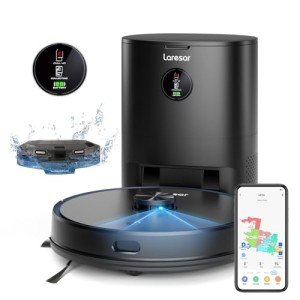14 Savvy Ways To Spend Leftover Robotic Vacuums Budget
The Rise of Robotic Vacuums: A Comprehensive Overview
In today's busy world, innovation is regularly progressing to make our lives simpler, and the household cleaning sector has witnessed one of the most notable developments: the robotic vacuum. This intelligent gadget not just saves time and energy however also guarantees a cleaner home environment with minimal manual effort. This article looks into the fascinating advancement of robotic vacuums, how they work, their benefits and downsides, market trends, and future directions.
The Evolution of Robotic Vacuums
Robotic vacuums have actually made fantastic strides since their creation in the late 1990s. The very first commercially offered robotic vacuum was presented in 1996, followed by different models, each developed with escalating elegance and functions. Here is a brief timeline of robotic vacuum advancement:
Year
Occasion
1996
Launch of the very first robotic vacuum (Electrolux's Trilobite)
2002
iRobot Roomba is launched, making robotics mainstream
2010
Introduction of innovative mapping and navigation features
2017
Combination of AI and smart home compatibility
2022
Introduce of highly advanced models including self-emptying dustbins
How Robotic Vacuums Work
Robotic vacuums utilize a mix of sensing units, algorithms, and synthetic intelligence to browse spaces successfully. Here's how they run:
Navigation: Most robotic vacuums use a series of sensing units to spot barriers and browse around furniture. Some high-end designs incorporate LIDAR (Light Detection and Ranging) innovation to produce in-depth maps of the environment.
Cleaning Mechanisms: They are geared up with turning brushes and suction systems to collect particles from different surface areas. Depending on the model, they can shift in between carpets and hard floorings perfectly.
Smart Features: Many contemporary robotic vacuums are Wi-Fi allowed, allowing users to manage them remotely by means of a smart device app. Features typically include scheduling, mapping out cleaning courses, and integration with other smart home gadgets.
Self-Maintenance: High-end systems may come with self-emptying capabilities, where the robot can dock itself to a base that gathers dust and debris without human intervention.
Benefits of Robotic Vacuums
Robotic vacuums have actually garnered immense popularity, and for good factors. Here are a few of the most substantial advantages:
- Time-Saving: Automating the cleaning process enables users to engage in other meaningful activities.
- Effective Cleaning: Regular cleaning can be easily achieved by arranging the robot to tidy everyday or weekly, keeping dirt and irritants at manageable levels.
- Compact Design: Their small size enables them to fit under furniture and in hard-to-reach locations.
Regardless of their advantages, robotic vacuums likewise feature limitations:
- Limited suction power: While they work for keeping clean floors, they may not match the deep cleaning of standard vacuums.
- Battery life: Most designs require to go back to their dock after a specific duration of usage.
- Preliminary expenses: High-quality robotic vacuums can be expensive, though costs have been reducing with improvements in innovation.
Existing Market Trends
The market for robotic vacuums is expanding rapidly. According to a current market research report, the worldwide robotic vacuum cleaner market is anticipated to reach ₤ 7.2 billion by 2027, growing at a CAGR of 23.5%, driven by a number of elements:
Increased Adoption of Smart Home Devices
The increase of smart home innovation has actually motivated consumers to integrate robotic vacuums into their homes. Many robotic vacuums work effortlessly with home assistants like Amazon Alexa and Google Assistant, simplifying their operation.
Advances in Robotics and AI
As the innovation behind robotic vacuums evolves, models are being equipped with better navigation systems, AI algorithms for finding out personal cleaning habits, and boosted features for particular floor types.
Concentrate on Health and Hygiene
The heightened awareness of cleanliness and hygiene, particularly due to current global occasions, has actually driven customers to invest in devices that routinely remove dust, irritants, and family pet hair from their homes.
Future Directions
As technology advances, robotic vacuums are anticipated to progress even more, including features that increase their efficiency in homes. Anticipated advancements consist of:
- Improved AI Learning: With developments in machine learning, future models will be better at understanding their environment and adapting to the requirements of their owners.
- Multi-Purpose Design: Potential future models may include functions for mopping, sanitizing, and air purification in addition to vacuuming.
- Sustainability: As eco-consciousness increases, producers are most likely to focus on energy effectiveness, recyclable products, and sustainable production practices.
Frequently Asked Questions About Robotic Vacuums
**1. Can robotic vacuums vacuum on carpet?Yes, the majority of robotic vacuums can transition in between different floor types, including carpets and hard floorings. 2. How frequently need to I run my robotic vacuum?It depends
on your family's cleaning requirements, however numerous users
arrange their robotic vacuums to run daily or every couple of days. 3. Are Top Robot Vacuum ?For numerous consumers, the time conserved and benefit offered by robotic vacuums makes them beneficial,
**
especially for hectic households. 4. Can I control my robotic vacuum remotely?Most contemporary robotic vacuums can be controlled through a mobile phone app, permitting scheduling and monitoring from anywhere. 5. Do I still need a standard vacuum cleaner?While robotic vacuums effectively manage everyday cleaning, a conventional vacuum might still be necessary for deep cleans or hardermesses. The advancement of robotic vacuums reflects a substantial leap in automating housework, combining innovative innovation with easy to use operation. As the trend towards smart homes continues and consumer expectations develop, robotic vacuums will likely keep enhancing, providing ever-greater convenience and effectiveness in keeping clean home. As property owners think about the potential advantages and limitations of these gadgets, it is clear that robotic vacuums have strengthened their credibility as vital tools in modern-day home management. 